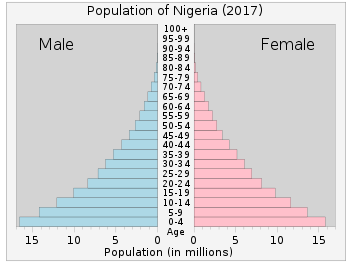Cover Story
‘Exploding population growth will worsen economic woes’

With the economy facing slower-paced growth an increasing number of Nigerian economists predict that youth demography could threaten early recovery. Indeed, according to Kemi Akeju, Ph.D, an economist who specializes in demography at the Ekiti State University (EKSU), Ado Ekiti, ”a large number of Nigerian youths , including those in Ekiti state, are finding it difficult to create entrepreneurial opportunities for themselves and are, therefore, resorting to unconventional or socially undesirable activities to stay financially afloat. To make matters worse those that choose to embark on tertiary studies are opting for courses that are not likely to build individual business capacity going forward”.
Akeju points to the fact that at the Faculty of Social Sciences at the University the most popular course of study is Political Science. ”This was an early shock to me because one would have thought that in a recessionary cycle managerial sciences would come up tops as preferred subjects of study for students”. But digging deep into the phenomenon she found out that, ”a growing number of students want to study political science because there is a widespread notion that the way to wealth, especially in a state like Ekiti, with limited manufacturing and commercial activities, is politics”. The University’s political science department in the last three years, according to Akeju, has had to cope with a deluge of students seeking admission in the department thereby making political science, ”the Cinderella Course in the Social Sciences Faculty”, she notes with concern.
 ”While I think Political Science is a great course”, she says, ”however we must be clear that modern societies grow their economies through manufacturing, commerce, technology and Information and Communication (ICT) advancements, political administration is a bootstrap that ties it all together by policy initiatives”. That perspective is not shared by EKSU students. Tajudeen Akinnifesi, a science student at the school notes that, ”quite a number of my friends are studying Political Science at the moment because once they graduate they are likely to get decent jobs as political aids or find their way into a number of choice government agencies; where will my science take me in Ekiti apart from teaching?”, he queries. He admits that not everybody can be political scientists and not all political science graduates will find employment in government, ”but it is a heck of a lot better than coping with the uncertainty of being a science major” he insists bitterly.
”While I think Political Science is a great course”, she says, ”however we must be clear that modern societies grow their economies through manufacturing, commerce, technology and Information and Communication (ICT) advancements, political administration is a bootstrap that ties it all together by policy initiatives”. That perspective is not shared by EKSU students. Tajudeen Akinnifesi, a science student at the school notes that, ”quite a number of my friends are studying Political Science at the moment because once they graduate they are likely to get decent jobs as political aids or find their way into a number of choice government agencies; where will my science take me in Ekiti apart from teaching?”, he queries. He admits that not everybody can be political scientists and not all political science graduates will find employment in government, ”but it is a heck of a lot better than coping with the uncertainty of being a science major” he insists bitterly.
It is this situation that make states like Ekiti, which has the potential of being one of Nigeria’s academic bellwethers, betray its competitive capacity, given that the state was once reputed to have the largest number of academics per family in the country. Mr. Akindele Ogunsola, a lecturer in the department of Economics at EKSU, points out that, ”global economies are spending more resources on human rather than physical capital. It is an established fact that the return on intelligence (ROI) significantly exceeds the return on physical capital (ROC), therefore, smart nations and governments are directing a growing amount of resources into research and development, an area Nigeria lags far behind. Little wonder that our production functions are flat and stationary”. Ogunsola’s argument is that the more youthful labour that comes out of the country’s schools the less impact they make on industrial output.
”We need to match skilled labour with national or local production needs. Wearing a jacket on a monkey doesn’t make it human, neither does training labour for a disappearing market make any sense.” he insists. According to Ogunsola, ”a state like Ekiti needs to clearly identify and take advantage of the agriculture and mining sector value chains, while educating its youth in enterprises they can thrive in after their academic studies. What we have today is a conveyour belt of well-trained economic misfits”. The trouble is that a large number of the states students are piling into liberal arts and social science courses while the pure sciences such as technology, engineering and mathematics (STEM) have been treated with cold shoulders. Says Ogunsola, ”we are skipping into a rabbit hole of bad choices and could end up being in a very poor economic space if we do not increase spending on courses that will lead us into widespread growth. Dinosaurs died not because of their large sizes but because of their inability to adapt. If we are not going to end up like these prehistoric giants we must adapt our educational system to meet the emerging needs of a new economic age, a new political order and a new social logic ”.
Reinforcing Ogunsola’s observations Dr. Akeju points outs that, ”Ekiti state and the federal authorities need to quickly do something about the management of Nigeria’s youth demography. We are a nation of young people who need to find a repository for our abundant energy and creativity. As everybody knows nature abhors a vacuum; if we don’t find multiple ways of getting youths occupied constructively we may end up breeding a generation hooked on high expectations, low productivity and destructive social values. To be sure, a nation rarely rises above the quality of its young people”, she argues.
Nigeria has a population of 198 million people which is currently growing at a rate of 3 per cent per annum; applying the law of 70 this population will double in 23 years meaning that by 2041 the country will have a staggering 396 million people living within its borders. How this swarm of humanity will feed, clothe, and house themselves, will be a miracle judging by current standards of economic management. The nation’s real gross domestic product (GDP) is pushing ahead at slightly under 2 per cent per annum (or 1.9 per cent by International Monetary Fund (IMF) projections). This means that population growth presently outstrips national output growth by 100 basis points.
‘’This means than output per person is digging a pit hole and could lead to hardcore poverty over the next few years without a major tuning up of production and productivity’’, notes Ekiti State University’s Dayo Olanipekun, Ph.d, a lecture at the department of Economics. Olanipekun argues that, ‘’the population growth rate and its demography needs a strategic review to ensure that we contain the pace of its growth while structuring the economy to enhance job opportunities for those between ages of 18 and 35 years. Not taking this approach will lead to a long dark night of social unrest, dislocation and disaster. Thomas Malthus, the economist who predicted this outcome in 18th Century England, would stare at Nigeria and wonder how we got so silly as to fall into this trap 220 years after he warned against it.’’ As far as Olanipekun is concerned, ‘’economics guides against stupidity but does not prevent it’’.



